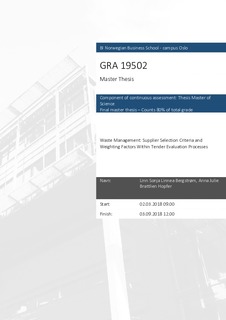| dc.description.abstract | The research aims at investigating the connection between supplier selection
criteria and the achievement of innovative and sustainable contracts. During 2017,
the Norwegian waste marked suffered from the bankruptcies of two of the largest
household waste collectors. The municipalities that were responsible for the
outsourcing of the contracts received massive criticism for how they conducted
the tender evaluation processes, especially since the contracts were awarded to the
supplier that offered the lowest price. Factors like changes in trends, new
technology, and an increased focus on the circular economy have increased the
complexity of waste collection and transport services. Thus, it is found evidence
that it is no longer sustainable to outsource the service exclusively on price. One
suggested action that has received attention lately is the usage of non-economic
supplier selection criteria, which permits the selection of a supplier with a greater
focus to other aspects like, i.e., their quality and environmental concerns. Since
the usage of non-economic award criteria is emerging, uncertainties regarding the
effect, definitions, and proper usage are still discussed. Based on the bankruptcies
and increased usage of non-economic criteria, our research aims to answer the
proposed research question: “How does the weighting of supplier selection criteria
affect the tender evaluation processes, and in what manner does the usage of
criteria promote the formulation of sustainable and innovative contracts?”.
A comparative case study approach was conducted to answer our research
question. Semi-Structured interviews with decision-makers within several
Norwegian municipalities provided an in-depth understanding of the usage and
implications of supplier selection criteria. Due to the nature of contracting out a
refuse collection service, theory within the area of public procurement, contract
management, project management, and supplier selection become relevant.
Further, the principal-agent theory is used to investigate communication and
market transparency. Lastly, transport economics provide the public purchasers'
insight into the cost drivers, which are found to be crucial for sustainable pricing.
Key words: Household waste management, municipal solid waste, outsourcing,
supplier selection criteria, award criteria, tender evaluation processes, publicprivate
procurement, household waste collection | nb_NO |
